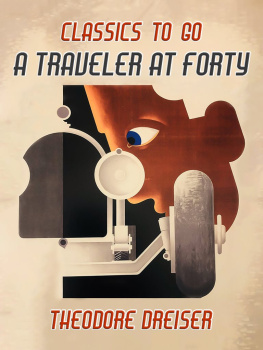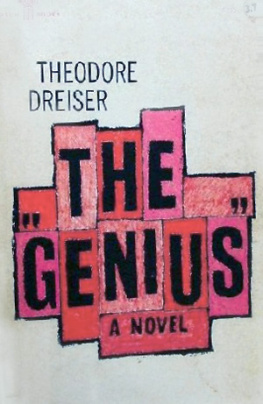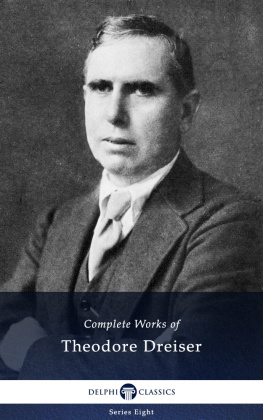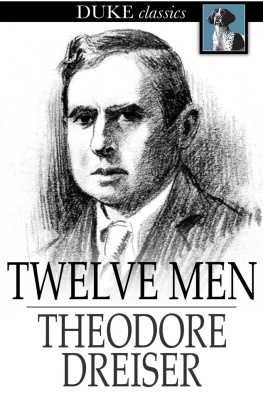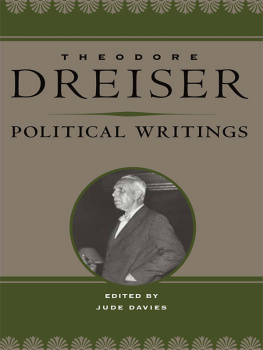A TRAVELER
AT FORTY
Theodore Dreiser
CONTENTS
| CHAPTER | PAGE |
| I | BARFLEUR TAKES ME IN HAND |
| II | MISS X. |
| III | AT FISHGUARD |
| IV | SERVANTS AND POLITENESS |
| V | THE RIDE TO LONDON |
| VI | THE BARFLEUR FAMILY |
| VII | A GLIMPSE OF LONDON |
| VIII | A LONDON DRAWING-ROOM |
| IX | CALLS |
| X | SOME MORE ABOUT LONDON |
| XI | THE THAMES |
| XII | MARLOWE |
| XIII | LILLY: A GIRL OF THE STREETS |
| XIV | LONDON; THE EAST END |
| XV | ENTER SIR SCORP |
| XVI | A CHRISTMAS CALL |
| XVII | SMOKY ENGLAND |
| XVIII | SMOKY ENGLAND (continued) |
| XIX | CANTERBURY |
| XX | EN ROUTE TO PARIS |
| XXI | PARIS! |
| XXII | A MORNING IN PARIS |
| XXIII | THREE GUIDES |
| XXIV | THE POISON FLOWER |
| XXV | MONTE CARLO |
| XXVI | THE LURE OF GOLD! |
| XXVII | WE GO TO EZE |
| XXVIII | NICE |
| XXIX | A FIRST GLIMPSE OF ITALY |
| XXX | A STOP AT PISA |
| XXXI | FIRST IMPRESSIONS OF ROME |
| XXXII | MRS. Q. AND THE BORGIA FAMILY |
| XXXIII | THE ART OF SIGNOR TANNI |
| XXXIV | AN AUDIENCE AT THE VATICAN |
| XXXV | THE CITY OF ST. FRANCIS |
| XXXVI | PERUGIA |
| XXXVII | THE MAKERS OF FLORENCE |
| XXXVIII | A NIGHT RAMBLE IN FLORENCE |
| XXXIX | FLORENCE OF TO-DAY |
| XL | MARIA BASTIDA |
| XLI | VENICE |
| XLII | LUCERNE |
| XLIII | ENTERING GERMANY |
| XLIV | A MEDIEVAL TOWN |
| XLV | MY FATHERS BIRTHPLACE |
| XLVI | THE ARTISTIC TEMPERAMENT |
| XLVII | BERLIN |
| XLVIII | THE NIGHT-LIFE OF BERLIN |
| XLIX | ON THE WAY TO HOLLAND |
| L | AMSTERDAM |
| LI | SPOTLESS TOWN |
| LII | PARIS AGAIN |
| LIII | THE VOYAGE HOME |
ILLUSTRATIONS
| Piccadilly Circus |
FACING
PAGE |
| I saw Mr. G. conversing with Miss E. |
| One of those really interesting conversations between Barfleur and Miss X. |
| I like it, he pronounced. The note is somber, but it is excellent work |
| Hoped for the day when the issue might be tried out physically |
| Here the Thames was especially delightful |
| Barfleur |
| The French have made much of the Seine |
| One of the thousands upon thousands of cafs on the boulevards of Paris |
| These places were crowded with a gay and festive throng |
| I looked to a distant table to see the figure he indicated |
| My heavens, how well she keeps up! |
| I sated myself on the house fronts or backs below the Ponte Vecchio |
| There can only be one Venice |
| A German dance hall, Berlin |
| Teutonic bursts of temper |
CHAPTER I
BARFLEUR TAKES ME IN HAND
I have just turned forty. I have seen a little something of life. I have been a newspaper man, editor, magazine contributor, author and, before these things, several odd kinds of clerk before I found out what I could do.
Eleven years ago I wrote my first novel, which was issued by a New York publisher and suppressed by him, Heaven knows why. For, the same year they suppressed my book because of its alleged immoral tendencies, they published Zolas Fecundity and An Englishwomans Love Letters. I fancy now, after eleven years of wonder, that it was not so much the supposed immorality, as the books straightforward, plain-spoken discussion of American life in general. We were not used then in America to calling a spade a spade, particularly in books. We had great admiration for Tolstoi and Flaubert and Balzac and de Maupassant at a distancesome of usand it was quite an honor to have handsome sets of these men on our shelves, but mostly we had been schooled in the literature of Dickens, Thackeray, George Eliot, Charles Lamb and that refined company of English sentimental realists who told us something about life, but not everything. No doubt all of these great men knew how shabby a thing this world ishow full of lies, make-believe, seeming and false pretense it all is, but they had agreed among themselves, or with the public, or with sentiment generally, not to talk about that too much. Books were always to be built out of facts concerning our better natures. We were always to be seen as we wish to be seen. There were villains to be sureliars, dogs, thieves, scoundrelsbut they were strange creatures, hiding away in dark, unconventional places and scarcely seen save at night and peradventure; whereas we, all clean, bright, honest, well-meaning people, were living in nice homes, going our way honestly and truthfully, going to church, raising our children believing in a Father, a Son and a Holy Ghost, and never doing anything wrong at any time save as these miserable liars, dogs, thieves, et cetera, might suddenly appear and make us. Our books largely showed us as heroes. If anything happened to our daughters it was not their fault but the fault of these miserable villains. Most of us were without original sin. The business of our books, our church, our laws, our jails, was to keep us so.
I am quite sure that it never occurred to many of us that there was something really improving in a plain, straightforward understanding of life. For myself, I accept now no creeds. I do not know what truth is, what beauty is, what love is, what hope is. I do not believe any one absolutely and I do not doubt any one absolutely. I think people are both evil and well-intentioned.
While I was opening my mail one morning I encountered a now memorable note which was addressed to me at my apartment. It was from an old literary friend of mine in England who expressed himself as anxious to see me immediately. I have always liked him. I like him because he strikes me as amusingly English, decidedly literary and artistic in his point of view, a man with a wide wisdom, discriminating taste, rare selection. He wears a monocle in his right eye, la Chamberlain, and I like him for that. I like people who take themselves with a grand air, whether they like me or notparticularly if the grand air is backed up by a real personality. In this case it is.
Next morning Barfleur took breakfast with me; it was a most interesting affair. He was latevery. He stalked in, his spats shining, his monocle glowing with a shrewd, inquisitive eye behind it, his whole manner genial, self-sufficient, almost dictatorial and always final. He takes charge so easily, rules so sufficiently, does so essentially well in all circumstances where he is interested so to do.
I have decided, he observed with that managerial air which always delights me because my soul is not in the least managerial, that you will come back to England with me. I have my passage arranged for the twenty-second. You will come to my house in England; you will stay there a few days; then I shall take you to London and put you up at a very good hotel. You will stay there until January first and then we shall go to the south of FranceNice, the Riviera, Monte Carlo; from there you will go to Rome, to Paris, where I shall join you,and then sometime in the spring or summer, when you have all your notes, you will return to London or New York and write your impressions and I will see that they are published!

